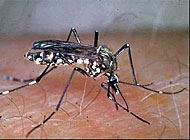Malaria trials: balancing profit and social responsibility

Successful trials of a candidate malaria vaccine involving scientists from the Swiss Tropical Institute in Basel have raised questions about how it would be delivered and marketed to people in the developing world who most need but are unable to afford medical treatment.
The World Health Organization (WHO) estimates that as many as 300 million people suffer from acute malaria every year. The vast majority of them live in developing countries and cannot purchase medicine at prices paid in the developed world. An estimated one million people die from malaria each year.
Bernard Nahlen, an adviser to WHO’s Roll Back Malaria project, says the challenge for governmental and non-governmental organisations has been to encourage pharmaceutical companies involved in the marketing of tropical medicines to focus more on social responsibility and less on profit.
Nahlen suggests that at least as much money is being spent on research into a vaccine for tourists and military personnel from developed countries who travel to malaria-infected parts of the world as on a vaccine for people suffering from the disease in Africa.
“The reality is that a vaccine which will protect travellers from malaria infection is going to have a larger profit margin than a vaccine which will help very poor people living in parts of the world where there is a very real risk of dying from malaria,” Nahlen told swissinfo.
Novartis discounted prices
But WHO says some companies are changing their strategy. He cites a deal WHO signed earlier in the year with the Swiss pharmaceutical company Novartis, to provide African countries with its newest anti-malaria drug at a reduced price.
Novartis agreed to supply the new therapy, called Coartem, to WHO at the cost price of $2.40 for a full treatment of 24 tablets. The therapy costs up to $40 in the West.
WHO is concerned about the limited amount of coverage malaria and its debilitating effects receive in the media, says Nahlen.
“The real tragedy,” he said, “is that malaria is so much a part of the landscape and people die from it so frequently that it’s almost become acceptable”.
“A certain number of people are nowadays expected to die from malaria, in the same way that several centuries ago people would have been expected to die of tuberculosis here in Switzerland,” Nahlen added.
Linda Stephen, international product manager for tropical medicine at Novartis, agrees that malaria does not receive as much attention as other high-profile diseases such as Aids, but says it is not just up to the pharmaceutical companies to fight the disease.
“Organisations like WHO, which represent the health consciousness of the world, should be launching even more campaigns to make the disease better known,” she said.
“They should be doing more to spread news about it, and I don’t know why the onus has to rest on the pharmaceutical industry,” she added.
Shareholders’ money
Klaus Leisinger, executive director of the Novartis Foundation, argues that the debate about malaria proves that issues of social responsibility and profitability are not mutually exclusive.
“I am convinced that in the long run a company cannot remain profitable if it does not live up to its social responsibility,” Leisinger said in a recent interview with swissinfo.
“You need the balance of social responsibility on the one hand and responsibility towards the shareholders on the other, because at the end of the day it’s their money you are using to carry out your work.”
Stephen agrees that Novartis’s greatest dilemma is finding a balance between producing medicine accessible to all and responding to the demands of those who hold the purse strings.
“I think we do have a humanitarian obligation…but you have to keep it realistic and strike a balance, because if you don’t show a profit, you won’t satisfy your shareholders.”
But the issue of how to provide global access to a vaccine for malaria will remain hypothetical until clinical trials are completed and drug patents awarded.
While several teams of scientists in Switzerland and around the world refine and improve on candidate vaccines, WHO says its task is to mobilise governmental support in the battle to eradicate the disease.
“The key question,” argues Nahlen, “is will the international community be willing to step forward and figure out how to make a future vaccine accessible and affordable? That’s the challenge for the future”.
by Ramsey Zarifeh

In compliance with the JTI standards
More: SWI swissinfo.ch certified by the Journalism Trust Initiative
You can find an overview of ongoing debates with our journalists here . Please join us!
If you want to start a conversation about a topic raised in this article or want to report factual errors, email us at english@swissinfo.ch.